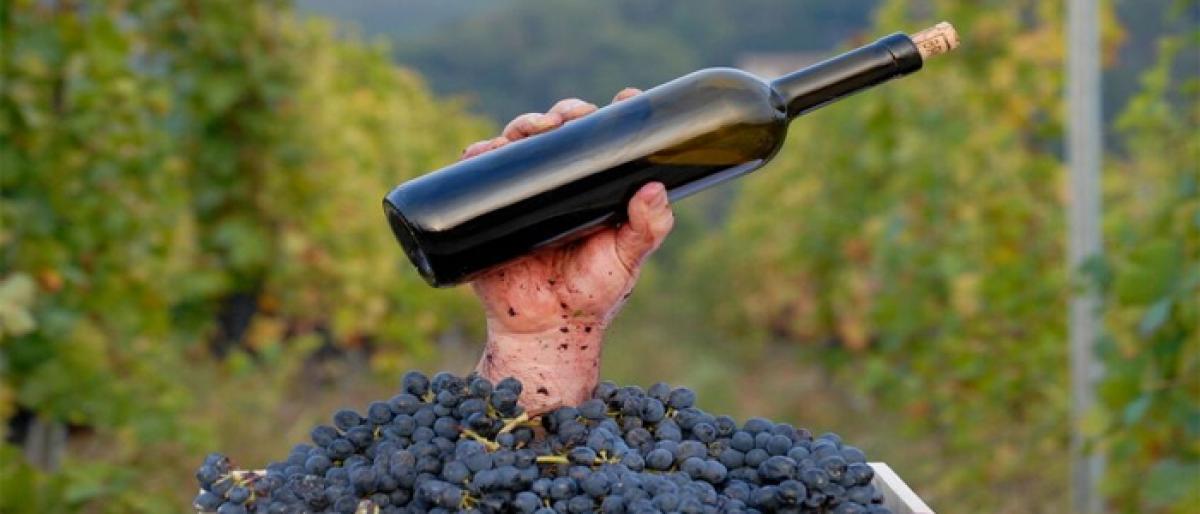Live
- A Guide to Temperature and Humidity Standards in Data Center Server Rooms
- Gadwal collector briefs on details of voters
- Jupally Krishna Rao takes part in Alampur rallu
- Bharath Prasad files 3rd Nomination
- Baisakh Month: A Time of Auspicious Beginnings and Sacred Festivals
- Oust BJD govt for overall development, says Shah
- Unveiling the Hidden Gems: Surprising Health Benefits of Garlic Peels
- Overcoming Sleep Struggles: A Comprehensive Guide to a Restful Night
- RTC bus hit the auto
- MLA Kuchukula Rajesh Reddy participated in the Birappa festival
Just In

The wine industry in India is still developing It started around 30 years ago and there are about 75 wineries Wine consumption is growing rapidly with the wine market budding by nearly 20 per cent for the last few years
The wine industry in India is still developing. It started around 30 years ago and there are about 75 wineries. Wine consumption is growing rapidly with the wine market budding by nearly 20 per cent for the last few years.
There is a requirement of many skilled personnel in this industry every year. The likely roles are listed below.
Core wine knowledge
Knowledge of vine growing, wine analysis and winemaking is crucial to this industry. Oenology or Enology is the science of winemaking while the science of cultivating vineyards is called viticulture. These are specialised knowledge and are a must to be a good viticulturist or a great winemaker. A good viticulturist ensures that the grapes produced in the vineyard are of excellent quality. Unless he provides this high-quality raw material, it will be difficult for the winemaker to make an exceptional wine. The winemaker will use the grapes and ensure that the wines produced are of consistent quality and even improve on his technique every year.
The winemaker has to work based on his experience of the fruit quality, vintage weather conditions and the tools available with him to make the wines. Every year is a new challenge for both roles as climate change is here and also a proactive outlook ensures that the wines are always of the best possible quality. There are many courses available in Australia, New Zealand, France and the USA. Taking up internship in Indian wineries and other winemaking regions during harvest can also expose you to the practical side.
What exactly is a winemaking role
The work involves taking decisions and managing the process of winemaking at various stages, right from growing grapes to the bottle. It involves visits to vineyards for grape berry sampling, assessing maturity of grapes, and deciding harvest dates. A winemaker is required to carry out laboratory analyses to check sugar levels, acidity, and post-fermentation alcohol levels. He also needs to plan harvest activities and taste the grape juice at the wine press, etc. The job also involves aligning viticulture needs with those of winemaking, as well as launching new brands. A winemaker spends more hours at work during the harvest season as opposed to the rest of the year. The skills needed for the job includes critical thinking and planning skills. It also requires expert knowledge of the fermentation process and skill in the art of blending the best lots together. Ability to adapt to strenuous work hours during harvest time is an added qualification. Knowledge of chemistry or biochemistry is very advantageous.
Allied wine knowledge
Knowledge of the various wine regions, wine styles and the service of wines is crucial to planning wine lists and wine pairing in the hospitality industry. Food and Beverage professionals can add value by learning up on wine courses being offered by many private certification groups like WSET or Court of Master Sommeliers. These degrees are essential to getting jobs for conducting professional tastings with various groups as required by the wineries. They also can provide jobs at hospitality divisions of various wine importers, luxury resorts, hotels or even hospitality operations run by wineries.
Experience gained during harvests, training and working in this line is very valuable. It is not a regular, run-of-the-mill production job. It involves working in relatively rural and sometimes beautiful, tranquil settings. It also gives you an opportunity to stay fit while sampling grapes in the vineyard or lifting buckets of wine or connecting hoses. Of course, an added advantage is that a glass of wine is always close by!
Ajoy Shaw - The writer is an Independent Consultant Winemaker and Wine Professional. He is also the consultant for Hyderabad-based Asav Wines.

© 2024 Hyderabad Media House Limited/The Hans India. All rights reserved. Powered by hocalwire.com







